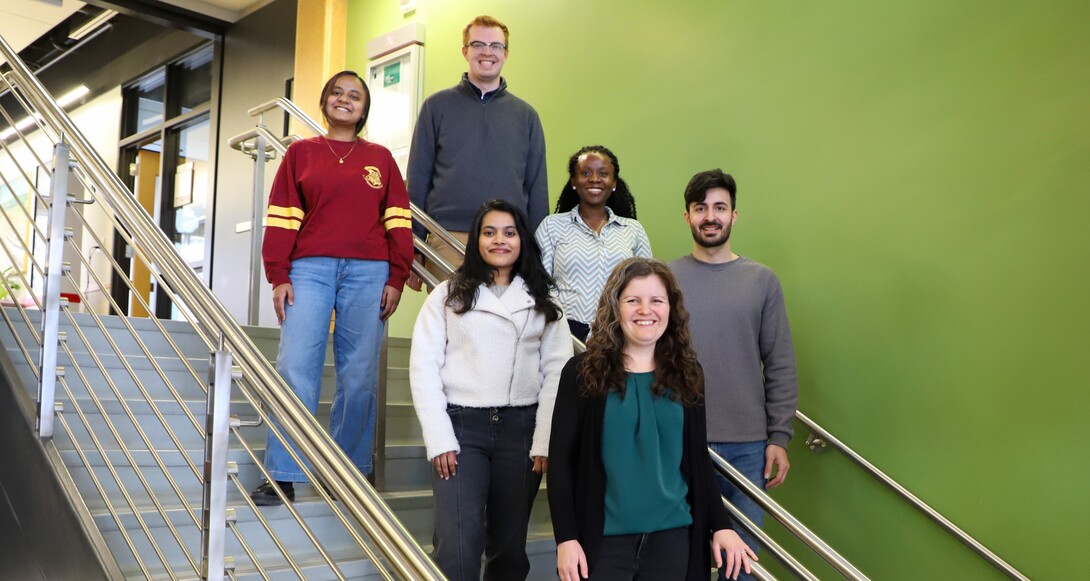
A new pilot program aims to help graduate students in the University of Nebraska–Lincoln’s Institute of Agriculture and Natural Resources better communicate their research to fellow scientists and the general public.
The IANR Writing Fellows program involves mentoring and peer support. Three writing fellows are participating over two years, and two others are participating on an expedited one-year timeline.
The initiative provides notable benefits for the short term and long term, two of the fellows said.
“Writing guidance can make a huge difference for grad students,” said Jennifer Okoliko, a doctoral student in human sciences with a specialization in leadership studies in the Department of Agricultural Leadership, Education and Communication. “It’s so easy to feel lost when we think about how overwhelming it is. What I love most about this program is that you get to both give and receive peer support and mentorship. It’s a great opportunity because you are providing feedback to others and improving your own writing skills in the process.”
Jaber Ghorbani Kahirzsangi, a doctoral student in the Department of Food Science and Technology, said learning how to communicate research at conferences, with industry professionals and with the public helps one’s work reach a broader audience.
The Writing Fellows program is encouraging, he said, because it offers graduate students the opportunity to receive detailed feedback on their writing, discuss any challenges they encounter and find the best way to present their results in a scientific and more understandable manner.
The program also includes a three-member, grad student cohort with Nafisa Lubna (School of Natural Resources), Kevin Steele (Biological Systems Engineering) and Sujani De Silva (Agronomy and Horticulture) participating over two years.
The initiative aims to build the fellows’ confidence by demystifying the writing process, said Christine Booth, a lecturer on scientific communication in the College of Agricultural Sciences and Natural Resources. As coordinator for the pilot project and mentor for the writing fellows, Booth breaks the writing process down into bite sizes that are more easily discussed and addressed.
A useful analogy is learning how to create the elaborate cakes showcased in a bakery, Booth said.
“A person might think, ‘I could never do that,’ but if the baker takes you step by step and breaks it down into a recipe, it’s more doable,” she said. “That’s how I see my role.”
Booth’s mentoring approach has value because it allows students to address the writing process one part at a time, Okoliko said. As students break down their ideas into more workable sizes, “complex things start to look a lot easier while still following academic standards without feeling stressed out.”
“Getting feedback can be a huge confidence boost,” she said.
Booth decided to pursue the writing fellows pilot after a recent teaching assistant of hers said he benefited greatly from working with her for two years in her graduate-level writing course and providing peer feedback to other graduate students.
For the writing fellows, the program’s first year is essentially a training year, Booth said. The fellows attend writing-focused workshops, practice evaluating other grad students’ work and receive individualized feedback.
The second year will involve in-depth writing practice and review of scientific manuscripts, including training of the next cohort, so that the two sets of writing fellows will overlap and enhance the learning process.
Booth said dozens of grad students expressed interest in the program. She was struck by students’ talent and thoughtfulness, and making the final selection was difficult as she looked to involve a range of academic disciplines and bring in students whose interests and aspirations complemented the program’s goals.
“This program is exceeding my expectations,” Okoliko said. “What I love most is that you get to both give and receive peer support and mentoring.”
The experience provides an additional benefit by equipping one to be a better adviser in the future, she said.
Kahrizsangi agreed.
“Having the chance to ask questions and compare my feedback with that of an experienced mentor is an incredibly valuable learning experience for me,” he said.







